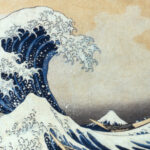 CINEMA FACULTY RECOMMENDS
CINEMA FACULTY RECOMMENDS
ARHI 105 • Overview of Western Art History • 3 semester hours
This course is an introduction and general survey of art and artists from Pre-historic times through the 20th century. Students will examine major periods and styles which have contributed to Western art through the use of slides, videos, and films in coordination with the lectures. Approved for General Education - Core 1.
 CINEMA FACULTY RECOMMENDS
CINEMA FACULTY RECOMMENDS
ARHI 207 • Non-Western Art History • 3 semester hours
This course introduces students to artistic cultures outside of the western tradition: Islam, Sub-Saharan Africa, India, China, Japan, and Mesoamerica. Each culture will be examined with an emphasis on major works of architecture, sculpture, painting, and crafts. Important historic, religious, and intercultural developments will be examined, along with the strong artistic connections between some of these cultures. Approved for General Education - Core 2.
 Studying American ideas, traditions, and institutions, prepares students to understand and engage the issues that confront citizens of this hemisphere. Choose one of many courses listed in the university CATALOG.
Studying American ideas, traditions, and institutions, prepares students to understand and engage the issues that confront citizens of this hemisphere. Choose one of many courses listed in the university CATALOG.
 What tools do humans use – physical, cognitive, and emotional – to adapt to their environments? While you may choose from many courses listed in the university CATALOG, the Cinema faculty recommends one the following:
What tools do humans use – physical, cognitive, and emotional – to adapt to their environments? While you may choose from many courses listed in the university CATALOG, the Cinema faculty recommends one the following:
COMM 100 • Human Communication
COMM 125 • Comm & Social Influence
JOUR 214 • Journalism & Society
CSD 125 • Psychology of Communication
 A student completing a course in Cultural Diversity and Social Pluralism will develop knowledge of diverse ways of living and thinking that are rooted in cultural, ethnic, racial, gender, and social differences. Choose one of many courses listed in the university CATALOG.
A student completing a course in Cultural Diversity and Social Pluralism will develop knowledge of diverse ways of living and thinking that are rooted in cultural, ethnic, racial, gender, and social differences. Choose one of many courses listed in the university CATALOG.
 Examine specific problems, issues, and choices, that confront individuals and society. Critically deepen your own moral values for informed decision-making. While you may choose from many courses listed in the university CATALOG, the Cinema faculty recommends one of the following:
Examine specific problems, issues, and choices, that confront individuals and society. Critically deepen your own moral values for informed decision-making. While you may choose from many courses listed in the university CATALOG, the Cinema faculty recommends one of the following:
HIST 105 • Holocaust on Film
JOUR 200 • Journalism Ethics
LIBR 106 • Information Ethics
 Students completing natural science courses with laboratory components will develop knowledge of science, and of the fundamental elements of the scientific processes in biology, chemistry, geology, or physics. Choose one of many courses listed in the university CATALOG.
Students completing natural science courses with laboratory components will develop knowledge of science, and of the fundamental elements of the scientific processes in biology, chemistry, geology, or physics. Choose one of many courses listed in the university CATALOG.
